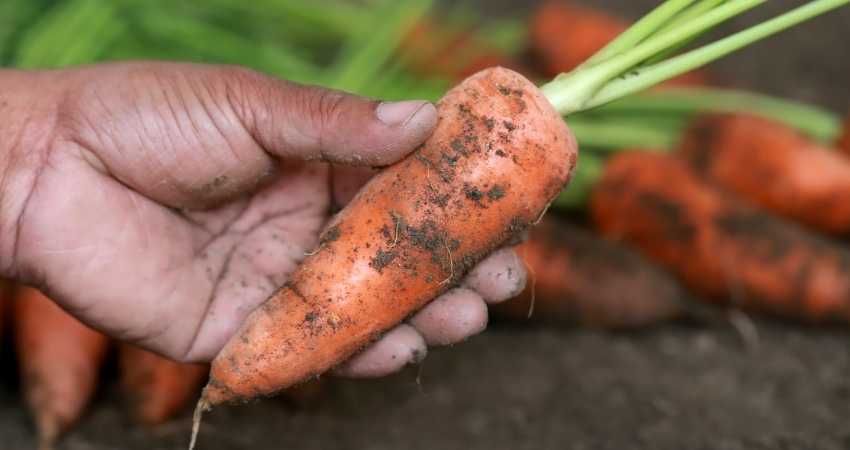Organic Carrots vs. Regular Carrots: What’s the Difference?
There are some differences between organic and regular carrots.
Organic carrots compared to regular have higher levels of iron, magnesium, and phosphorus. They also contain fewer nitrates than regular, which are unharmful to adults but are potentially harmful to babies. Organic carrots are more expensive than regular, however, and are susceptible to more natural variations in shape and size.
In the following article, we will discuss the scientific differences between organic and regular carrots and explore whether it’s worth shelling out the extra cash for the organic variety1.
Organic Carrots vs. Regular Carrots: Which Is Better?
As a Certified Health Coach many clients ask me about food comparisons including carrots. Also, I purchase and consume them every day. Therefore, I have researched this topic in the past and present. Let’s examine both types closely.
So, which of these orange vegetables is better? Organic carrots can have higher levels of vitamins, but they will cost more money.
Organic carrots are more ideal in theory, but large scale production of organic foods doesn’t seem to be realistic or sustainable. Regular carrots are still good for you, though their health benefits are lessened by the presence of pesticides.
Ultimately, eating either sort of carrot will provide you with health benefits such as lower blood pressure, diabetes control, and an increased immune system. If money is not a consideration, I would choose organic.

What’s in Organic and Regular Carrots?
Carrots contain a myriad of vitamins, minerals, and important fibers that are extremely beneficial to human health. One of the vitamins with the highest quantity in carrots is vitamin A.
Some more of the important nutrients in carrots include:
- Lutein
- Zeaxanthin
- Fiber
- Potassium
- Vitamin C
- Vitamin K
- Calcium
- Phosphorus
- Folate
- Vitamin E
Both organic and regular carrots have these nutrients in them, but studies have shown that they occur in different amounts.
Organic Foods & Carrots
Studies have found that there are differences in the nutritional benefits of organic and regular carrots. Though both varieties of the orange vegetable are good for you, organic carrots hold more nutrients2.
Organic carrots have been found to have up to 12% more iron, 69% more magnesium, and 13% more phosphorus than regular carrots. They have also been known to contain between 3 and 4 times fewer nitrates than their non-organic counterparts.
Another boost of nutrients that organic carrots contain is greater quantities of beta carotene and vitamin B1.
Clearly, organic carrots are better for you, but why?

The Difference Between Organic and Regular Carrots
We’ve learned that organic carrots have higher quantities of important vitamins and minerals, but what is the reason for it? First, we have to understand how organic and regular carrots are grown.
Regular Carrots
Regular carrots, or non-organic carrots, are regularly treated with pesticides throughout the growing process.
Pesticides are chemicals that kill bugs and fungus. Farmers want to rid their fields of these pests because they can cause a loss of produce. The more produce that a farmer loses, the less product they have to sell to stores and manufacturing plants, and the less income they have that year.
Pesticides have been shown in scientific research to create health problems when ingested by humans3. It seemed like an obvious choice to avoid these products, but let’s look at some of the pests that can kill carrot crops.
Carrot Rust Flies
Carrot rust flies are a huge problem in the Northwest. They look similar to houseflies, although they have green bodies, banana-colored heads, and red eyes. These incessant pests lay eggs in the soil of the crop, and their larvae hatch in the millions.
The larva burrows into the roots of the carrots, damaging the cells. The roots turn an unappealing crimson, and the carrots become inedible.

Leaf Blight
Leaf blight is the disease that will most likely take over a carrot crop4. It is a fungal infection that attacks the leaves and stems of the plants. The leaves will gain spots that are black or dark brown and spread from leaf to leaf, and from plant to plant. The infection spreads through the influence of water, wind, and machinery.
Because leaf blight affects the greenery of the carrots, it prevents them from being harvested in the traditional way. The spread of leaf blight is quick, so if it’s not caught early, farmers can lose entire crops to it.
Aster Yellow Disease
Aster yellow is a disease that is unique but dangerous to vegetables5. Phytoplasma, a virus-like organism, is spread to the crops by leafhoppers. The bugs ingest the phytoplasma from infected plants and spread it to other plants as they feed on them.
What makes the disease so special is that it doesn’t kill the plants that it has infected, but it causes them to grow in deformed ways instead6. Carrots, for instance, may grow short and stubby, with little hair-like fibers extending out from the roots. The vegetables become bitter and inedible.
Parsley Worms
Parsley worms are chubby little caterpillars that have a striking combination of green, black, and yellow stripes. Parsley worms turn into lovely black swallowtail butterflies that are helpful for pollinating gardens, but when they are in their larval stage, they eat and eat and eat.
Much like the star of The Very Hungry Caterpillar book, these caterpillars don’t stop ingesting green leaves.
In a carrot crop, they can chew apart the sun-soaking leaves that the veggies require to grow.

Organic Carrots
Organic carrots are not grown with the use of chemical pesticides. Organic farmers do use “natural pesticides,” like copper and sulfur, to deter the presence of harmful bugs7. This may sound better at first, but the farmers tend to have to use a lot more of these types of pesticides as they are not as effective as the synthetic ones.
Farms that are organic also use traditional methods such as crop rotation8. This involves planting the carrots in different acres each year and allowing the previous year’s soil to recover9.
The earth will naturally replenish the vitamins and nutrients that were depleted from the growth of a crop over time. Once the crop is rotated back into that area, two to three years later, the soil will be rich again.
The lack of crop rotation is partly to blame for the lack of nutrients in regular carrots. The soil never has a chance to recover, and so there are fewer nutrients available for the carrots each year.
Organic carrots are not the be all end all in environmentalism, though. While it’s true that synthetic pesticides used in regular farming can be harmful to the flora and fauna around them, regular farming doesn’t use as much land as organic farming does10.
Organic farms have a much lower yield, meaning that fewer carrots are produced per square foot. This is because natural pesticides are less effective, so more of the organic carrots are lost to hungry bugs and fungal infections. To compensate for this loss, organic farmers use larger areas of land to grow their vegetables.
In turn, this means that organic carrots have a higher carbon footprint per piece than regular carrots do11.
The Price Difference
This leads us to our next subject: the price difference between organic and regular carrots. Organic vegetables are known to cost up to three times more than the regular version of the same plant12. Let’s examine some of the reasons why13.

Supply and Demand
One of the rules of microeconomics, supply and demand, says that if the demand for something is high, but the supply is low, the price will rise. This applies to organic food, too, that has a high demand in the USA, and a much lower supply than regular fruits and vegetables.
Higher Labor Costs
It costs more to grow and sell organic foods. This is in part because of the higher labor involved in growing organic food. When you remove the pesticides, fungicides, weed killers, and bug spray, there is a lot more work involved in farming.
That’s why those products were implemented in the first place. When you remove these chemicals, they need to be replaced with manpower.
Organic farmers spend more on the labor costs of their workers who need to pull weeds by hand and take care of the soil themselves.
Lower Crop Yield
Another reason why organic food is so expensive is because of the lower crop yield. On average, an organic carrot farm will produce fewer sellable carrots than a regular carrot farm of the same size.
To compensate for this loss, organic farmers charge more for their carrots, so they can still profit overall.
Handling Procedures
There are regulations around organic farming that add extra costs as well. Once organic vegetables have been harvested, they can’t be put in the same truck or processing plants as vegetables from regular farms.
Organic farmers must invest or outsource specific trucks, storage facilities, and processing plants that allow them to stay fully organic.
Environmental Protective Costs
There are extra costs to ensuring crops stay organic, and the soil stays healthy. These include things like regular soil examinations, proper drainage, crop rotation, and soil recovery.
A lot of organic farms were converted from regular farms, and the soil needs to be treated and purified for years before it can be considered truly organic.
Marketing
Of course, part of the reason organic food is more expensive is a marketing ploy. When people pay more for their food, they enjoy it more14. Pricing organic carrots higher may trick people into thinking that they taste better than the regular kind.
Product Consistency
Another area where organic and regular carrots differ is in product consistency. Because organic carrots are not guaranteed growth like regular carrots are, they are more susceptible to the natural conditions of the world. This can cause lots of varieties in the carrots, like odd sizes and colors.
Most of these issues are superficial, and organic food lovers have usually come to terms with the irregular appearance of their foods. People who eat regular carrots, however, have come to demand a certain appearance from their foods.
It might surprise you to hear that almost half of all US produce is thrown away15. Much of this is chalked up to quality control, but a lot of it boils down to the appearance of the product as well.
Regular carrot buyers expect their carrots to look a certain way, and so the farms try and fulfill this need. The carrots that won’t sell might get sent to a processed food plant or thrown in the trash.
Tips for Shopping Organic
If you decide that organic carrots are better for you, there are some things you should keep in mind while shopping.
Expect to See Color
Carrots come in more colors than orange. Carrots can be purple, yellow, red, and even white. Regular carrots can come in these varieties too; they are simply more welcome in the organic community because of their irregularities.
Store Them Properly
Many people report that organic carrots don’t last as long as regular carrots. This is most likely because they are different varieties of carrots. The non-organic carrots have been bred over decades to increase their shelf-life and earning potential.
Luckily, there is a trick to storing organic carrots so that they last longer.
- Cut off the green leaves of the carrots and put them in a container with water.
- Ensure that the carrots are fully submerged and store the container in your refrigerator.
- Change the water every 4-5 days, and your carrots will stay fresh.
If you want your carrots to last even longer, you have two choices: you can freeze your carrots, or bury them in the sand.
That’s right, according to Sweetwater Organic, “carrots can also be stored unwashed and covered by sand16. If stored in this manner in a dark, cool, well-ventilated area, the carrots will last up to 5 or 6 months. They can also be left in the ground, covered with mulch, and used as needed until the ground begins to freeze.”

Put the Peeler Away
When you buy organic carrots, there is no reason to peel the skin off of them. Simply wash the carrots in cold water, scrubbing them with a brush, and they are ready to be eaten. Since there are no harmful pesticides residing in the skin of the carrot, it is safe to eat.
Tips for Buying Regular Carrots
If you decide that regular carrots are right for you, follow the tips below to make the most of your produce.
Wash Them When You Get Home
As soon as you return home with your carrots, you should give them a rinse. Not only will this get rid of 90-99% of potentially negative pesticides, but it will also remove traces of dirt, sand, and other things that may have stuck to the carrots in transit.
Peel Before Eating
When you’re buying whole, regular carrots, it’s important to peel them before cooking with them or eating them. This is because most of the chemicals used to treat the produce while it grows will be stored on the skin of the carrot.
There is still a certain amount of pesticides that will have entered the meat of the vegetable, but with carrots, the risk is relatively low. Since carrots grow below ground, they will absorb fewer chemicals than a vegetable that is exposed to the air, like tomatoes.
Growing Your Own Carrots
Perhaps the ultimate solution to the carrot debate is to grow your own carrots. This allows you to control exactly what is on the surface of the dirt and what is in the soil. Garden fresh vegetables are bursting with flavor, color, and variety. No two homegrown carrots look alike, and you’ll appreciate having worked for their nutrients.
If you have any questions to ask me about this article don’t hesitate to comment below or email us. You can find an email on our contact page.
Read Next – More Food vs. Food Articles!
Organic Mango vs. Conventional Mango: Which is Better?
Organic Flaxseed vs. Non-Organic Flaxseed: Which is Better?
Organic Bananas vs. Regular Bananas: Which is Better?
- USDA: USDA Scientists Take an Organic Approach to Improving Carrots [↩]
- USDA: Organic versus Conventionally Grown Produce: Quality Differences, and Guidelines for Comparison Studies [↩]
- ABC NEWS: Organic vs. Nonorganic: What Fruits and Veggies Should You Buy [↩]
- Department of Primary Industries and Regional Development: Leaf blight of carrots [↩]
- Pacific Northwest Pest Management Handbooks: Carrot-Aster Yellows [↩]
- Saskatoon Star Phoenix: Aster Yellows – a common garden disease [↩]
- Scientific American: Mythbusting 101: Organic Farming> Conventional Agriculture [↩]
- Wikipedia: Crop rotation [↩]
- USDA: Cover crops and rotational grazing are more widely used by organic producers [↩]
- National Center for Biotechnology Information: Impact of pesticides use in agriculture: their benefits and hazards [↩]
- Wikipedia: Carbon footprint [↩]
- FAO: Organic Agriculture [↩]
- How Stuff Works: How Organic Foods Works [↩]
- NewsWise: Don’t Like the Food? Try Paying More [↩]
- The Guardian: Half of all US Food produce is thrown away, new research suggests [↩]
- Sweetwater Organic: Carrots [↩]
